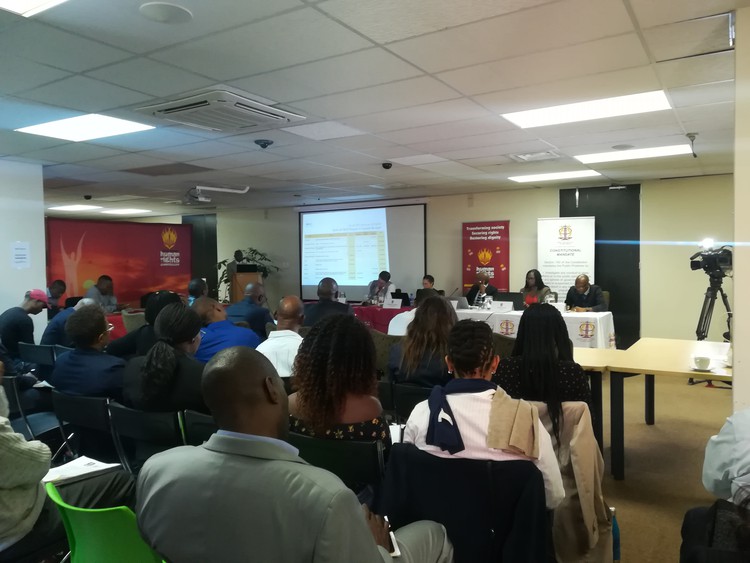
The inquiry into the recent protests in Alexandra was told that the City of Johannesburg does not have the resources to deal with continuous land occupations in Alexandra. Photo: Zoe Postman
14 May 2019
The City of Johannesburg does not have the resources to deal with the continuous land occupations in Alexandra, City Manager Ndivhoniswani Lukhwareni told the inquiry into Alexandra on Tuesday.
The three-day inquiry, by the South African Human Rights Commission (SAHRC) and the Public Protector’s office, follows a recent spate of protests in Alexandra.
Its purpose is to consider some of the issues raised during the protests such as the lack of housing, water, sanitation and overcrowding in the township. The inquiry will also look into allegations of corruption in the Alexandra Renewal Project (ARP) - a project initially worth R1.6 billion, launched in 2001 to develop Alexandra.
Lukhwareni denied that the City was ignoring the continuous mushrooming of shacks and houses in Alexandra, as some residents had alleged in the inquiry on Monday.
“We do go there and demolish but it is impossible to go every day… We wish we could go demolish in one area and people would learn a lesson so we can move on but it doesn’t happen that way,” he told the panel.
He said residents kept rebuilding after their homes were demolished. “Can the municipality have enough resources to keep going through that cycle?” he asked.
Lukhwareni showed the inquiry photos of Johannesburg Metro Police Department (JMPD) officers demolishing houses under electric pylons in Alexandra. “Here are pictures of the City doing exactly what residents say we do not do,” he said.
He said living under the pylons was extremely dangerous “because there are corrugated zinc roofs which conduct electricity… If the pylons had to collapse it would be a disaster that is unimaginable”. He said houses were also built on fire hydrants and manholes in Alexandra.
Lukhwareni said a task team, headed by the JMPD, had been set up to deal with land occupations. The team included officials from the Department of Social Development, Johannesburg Property Company and City planning, he said.
“The process of demolishing requires many other people… we need to give people notice, get court orders, find the owner of the land, notify the ward councillors and provide alternative accommodation,” he said.
Alexandra Fitzgerald, a senior legal officer on the SAHRC panel, asked Lukhwareni why the City had allowed residents to build on fire hydrants and river banks.
“If anyone attempted to build on a fire hydrant in Sandton, it would be stopped very quickly but it has been allowed to happen in Alex. Where was the City when these structure were first put up, not down the line when people have settled and moved their belongings there? ” she asked.
Fitzgerald made it clear that the SAHRC was not in favour of demolition but she said it was not safe for people to live in those conditions.
Lukhwareni said the City was stuck between “a very stiff hand and a humanitarian approach” when it came to demolitions. “More can be done but we are living in a world of limited resources,” he said.
He said it was not sustainable for the City to guard certain areas to ensure that land occupations did not take place.
The inquiry continues on Wednesday.